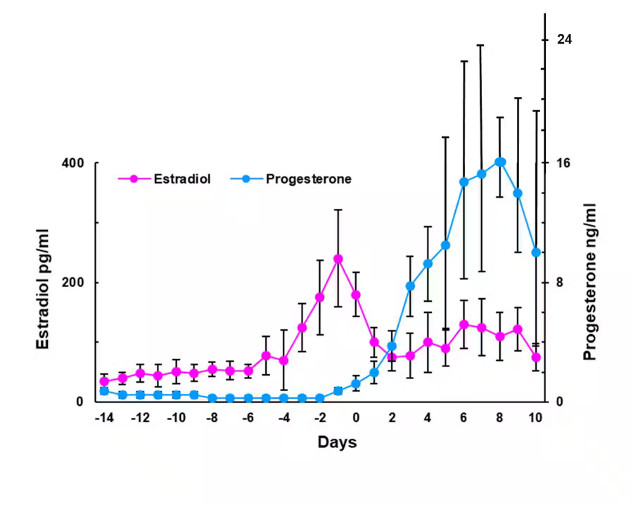
Hormonal contraceptives have functions that go beyond just birth control. Mindful Media/E+ via Getty Images
More than 85% of women - 和 超过300百万人 worldwide at any given time – use hormonal contraceptives for at least five years of their life. Although primarily taken for birth control, many people also use hormonal contraceptives to manage a variety of symptoms related to menstruation, from cramps and acne to mood swings.
针对 高达10%的女性, however, hormone contraceptives can increase their risk of depression. Hormones, including estrogen and progesterone, are crucial for brain health. So, how does modifying hormone levels with hormone contraceptives affect mental health?
我是一个 researcher studying the neuroscience of stress and emotion-related processes. I also study sex differences in vulnerability and resilience to mental health disorders. Understanding how hormone contraceptives affect mood can help researchers predict who will experience positive or negative effects.
How do hormone contraceptives work?
In the U.S. and other western countries, the most common form of hormonal contraceptive 是“药丸” – a combination of a synthetic estrogen and a synthetic progesterone, two hormones involved in regulation of the menstrual cycle, ovulation and pregnancy. Estrogen coordinates the timed release of other hormones, and progesterone maintains a pregnancy.
This may seem counterintuitive – why do naturally occurring hormones required for pregnancy also prevent pregnancy? And why does taking a hormone reduce the levels of that same hormone?

When estrogen and progesterone reach a certain threshold level, the body decreases their production. Dharani Kalidasan/R.I. McLachlan et al. 1987 via Wikimedia Commons, 创用CC BY-SA
Hormone cycles are tightly controlled by the hormones themselves. When progesterone levels increase, it activates processes in cells that shut off production of more progesterone. This is called a 负反馈回路.
Estrogen and progesterone from the daily pill, or other common forms of contraceptives such as implants or vaginal rings, cause the body to decrease production of those hormones, reducing them to levels observed outside the fertile window of the cycle. This disrupts the tightly orchestrated hormonal cycle required for ovulation, menstruation and pregnancy.
Brain effects of hormonal contraceptives
Hormonal contraceptives affect more than just the ovaries and uterus.
The brain, specifically an area called the hypothalamus, controls the synchronization of ovarian hormone levels. Although they’re called “ovarian hormones,” 雌激素 和 黄体激素 receptors are also present throughout the brain.
Estrogen and progesterone have broad effects on neurons and cellular processes that have nothing to do with reproduction. For example, estrogen plays a role in processes that control memory formation and protect the brain against damage. Progesterone helps regulate emotion.
By changing the levels of these hormones in the brain and the body, hormonal contraceptives may modulate mood – for better or for worse.
Hormonal contraceptives interact with stress
Estrogen and progesterone also regulate the 压力反应 – the body’s “fight-or-flight” reaction to physical or psychological challenges.
The main hormone involved in the stress response – cortisol in humans and corticosterone in rodents, both abbreviated to CORT – is primarily a metabolic hormone, meaning that increasing blood levels of these hormones during stressful conditions results in more energy mobilized from fat stores. The interplay between stress systems and reproductive hormones is a crucial link between mood and hormone contraceptives, as 能量调节 is extremely important during pregnancy.
So what happens to someone’s stress response when they’re on hormonal contraceptives?
When exposed to a mild stressor – sticking an arm in cold water, for example, or standing to give a public speech – women using hormone contraceptives show a smaller increase in CORT than people not on hormone contraceptives.
Researchers saw the same effect in 大鼠和小鼠 – when treated daily with a combination of hormones that mimic the pill, female rats and mice also show a suppression of the stress response.
Hormonal contraceptives and depression
Do hormonal contraceptives increase depression risk? The short answer is it varies from person to person. But for most people, probably not.
It’s important to note that neither increased nor decreased stress responses are directly related to risk for or resilience against depression. But stress is closely related to mood, and chronic stress substantially increases risk for depression. By modifying stress responses, hormone contraceptives change the risk for depression after stress, leading to “protection” against depression for many people and “increased risk” for a minority of people. More than 9 out of 10 people who use hormonal contraceptives will not experience decreased mood or depression symptoms, and many will experience improved mood.
But researchers don’t yet know who will experience increased risk. Genetic factors and previous stress exposures increase risk for depression, and it seems that 相似因素 contribute to mood changes related to hormone contraception.
Currently, hormone contraceptives are usually prescribed 通过反复试验 – if one type causes side effects in a patient, another with a different dose, delivery method or formulation might be better. But the process of “try-and-see” is inefficient and frustrating, and many people give up instead of switching to a different option. Identifying the specific factors that increase depression risk and better communicating the benefits of hormone contraception beyond birth control can help patients make more informed health care decisions.![]()
相关书籍:
身体记录分数:创伤愈合中的大脑和身体
作者:Bessel van der Kolk
这本书探讨了创伤与身心健康之间的联系,提供了治疗和恢复的见解和策略。
呼吸:失落艺术的新科学
通过詹姆斯·内斯特
这本书探讨了呼吸的科学和实践,提供了改善身心健康的见解和技巧。
植物悖论:导致疾病和体重增加的“健康”食品中的隐患
通过 Steven R. Gundry
这本书探讨了饮食、健康和疾病之间的联系,提供了改善整体健康状况的见解和策略。
免疫密码:真正健康和彻底抗衰老的新范式
乔尔·格林
这本书提供了一个关于健康和免疫的新视角,借鉴了表观遗传学的原理,并提供了优化健康和衰老的见解和策略。
完整的禁食指南:通过间歇性、隔日和延长禁食来治愈你的身体
作者:Jason Fung 博士和 Jimmy Moore
本书探讨了禁食的科学和实践,提供了改善整体健康和保健的见解和策略。























